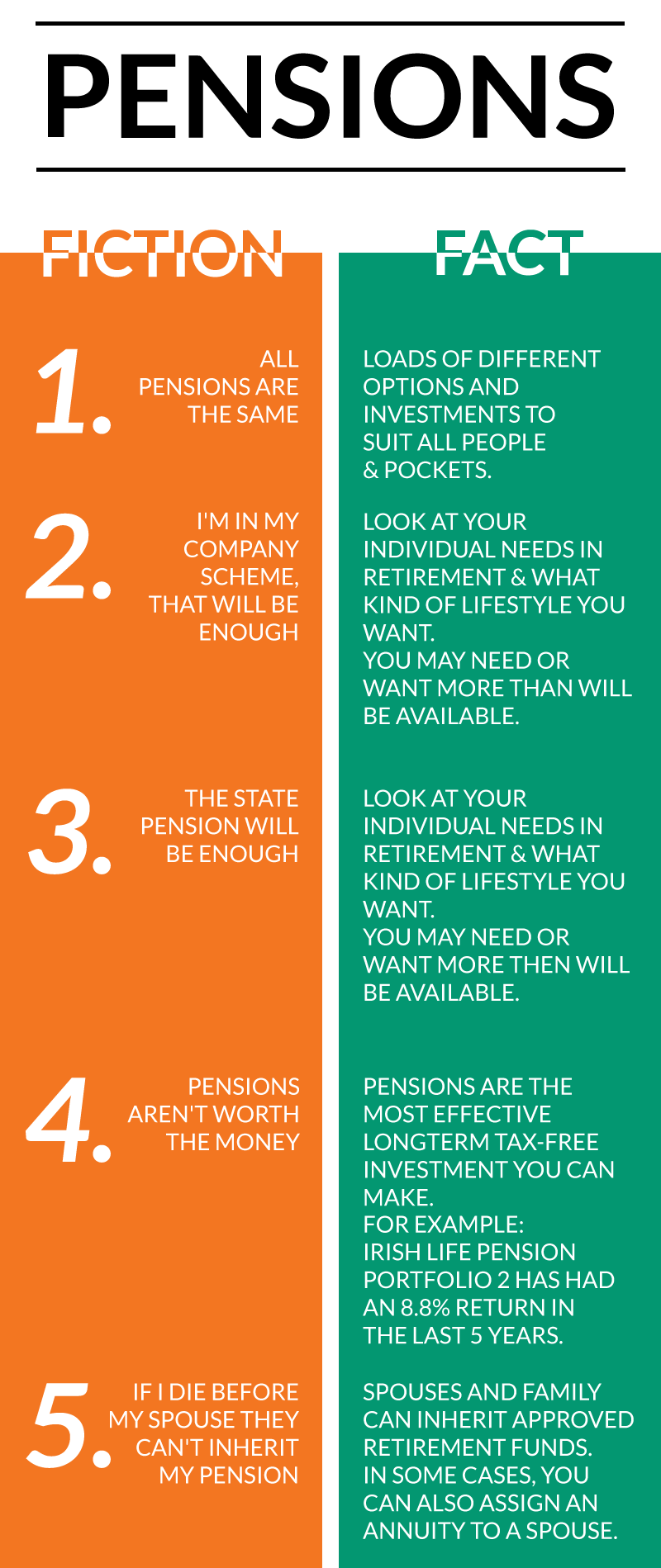Pensions can be confusing and overwhelming at the best of times.
At Greenway we focus on giving clear information to explain what is happening with Pensions in Ireland in 2019. From Census 2016, people 65 years and older saw the largest increase in population since 2011, rising by 102,174 to 637,567, a rise of 19.1%.
The average age of Ireland’s population will continue to increase, as with most of Europe, and you need to think now about providing for your future retirement.
what exactly is a pension?
A pension is a fund that you contribute to during your working life. This fund will then be invested to provide you with an income in retirement. There are many types of funds, and many types of pension products.
Pensions break into 2 main areas. The state pension and private pensions. We’ve given some general information about both below.
How much do I need to save for retirement?
This depends on the type of lifestyle you want in retirement. Use the Pension Authority Pension calculator to see what you need. This is an independent resource, to help you figure out what you need to put away each month to secure your retirement income.
Try focusing on what money you can afford to put away each month. There are methods to allow you to increase or decrease the amount you put into your pensions.
The state pension
The State Pension might not be enough to cover your costs in retirement. Currently, the State Pension for someone who has made all their PRSI contributions is €248.30 per week or €12,911.60 per year. Compare this to the wages for a full-time worker on minimum wage: €19,874.40.
How to check your PRSI contributions?
If your not sure if you qualify for the state pension you can check services.mywelfare.ie
Private Pensions Information
Benefits of pensions
You can get tax relief on your contributions (up to limits based on age and earnings).
Your fund is tax-free until you begin withdrawing your pension.
Growth is on the pre-tax amount of the fund allowing for greater growth.
Compound interest allows for additional growth on each year’s gains.
You have a certain amount of choice on how you would like to take your benefits at retirement. Depending on your scheme, this can include tax-free lumps on retirement (rules for lumps sums vary from scheme to scheme), purchasing annuities, or ARFs.
Many personal pensions allow a choice of funds. You can work with a broker to decide what level of risk and investment type you’re comfortable with and can change this as your circumstances change.
Several types of pension products will allow you to take breaks in your contributions, or increase your contributions, depending on changes in your circumstances.
Tax Relief Earning limit
- Your available tax relief increases as you age, to encourage you to contribute more at times in your life when your earnings are likely to be higher.
- When calculating your tax relief, the maximum allowable earnings to calculate it is €115,000.
- Your relief is calculated at your marginal rate of tax. Depending on your salary, this can make a difference to your Net pay.
Pension Tax Relief levels
| Age |
% Limit |
| Under 30 | 15% |
| 30 – 39 | 20% |
| 40 – 49 | 25% |
| 50 – 54 | 30% |
| 55 – 59 | 35% |
| 60 or over | 40% |
Pensions risks
- Your pension fund may fall in value as well as rise.
- The pension fund returns may not keep pace with inflation.
- The pension fund growth may not keep pace with a rise in the cost of providing pension benefits.
- Pensions are investment products and different levels of risk exist.
- Make sure you fully understand risks you are taking.
- A good pension advisor will be happy to explain all options available to you.

Pensions Saving Example
Shane is 42 who earns €40,000 per year can contribute up to €10,000 per a year into a pension and apply income tax reliefs. This saves the income tax on the €10,000. Lets do more tax calculations on this to show the actual cost.
Person: Shane
Age: 42
Income: €40,000
Marital status: single
Income Tax without pension
| Gross Income | €40,000 | |
| Tax payable @ 20% | €35,300 | |
| Amount payable | €7,060 | |
| Tax payable @ 40% | €4,700 | |
| Amount Payable | €1,880 | |
| Total Income Tax: | €8,940 |
Income tax with pension
| Total Income | €40,000 | |
| Annual Pension Contributions |
€5,000 | |
| Gross Income | €35,000 | |
| Tax payable @ 20% | €35,000 | |
| Amount payable | €7,000 | |
| Tax payable @ 40% | €0 | |
| Amount Payable | €0 | |
| Total Income Tax: | €7,000 |
Not only has Shane put €5,000 towards his retirement savings. He saved €1,940 on income tax. If Shane continued this until he is 68 years old he will build a pension fund of €130,000 and save €50,440 in income tax.
To see what you need to save for your pension each month visit The Pension Authority Pension calculator. This will give you an independent figure on what you need to save.
Your pension solution will be unique to you. Greenway can help you with personalised advice that puts you first.


